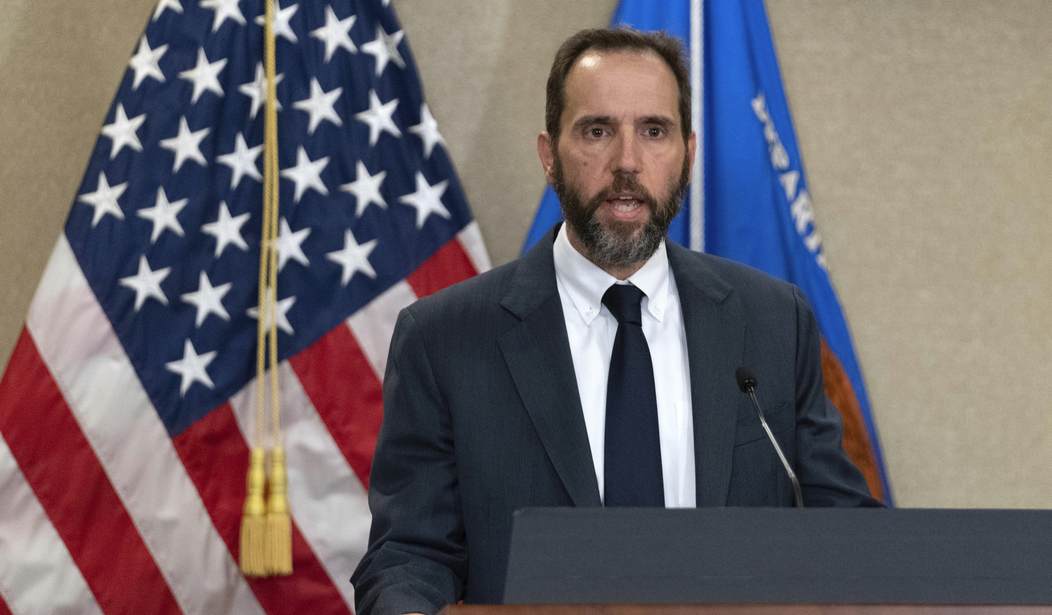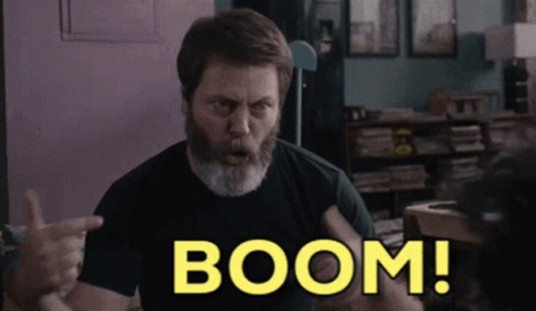Yesterday, we learned Trump was indicted. Again. This time he’s being indicted for activities related to January 6, 2021. And I promised to read the indictment and update you, dear reader, on it with my own analysis. And I thought picking on Jennifer Rubin would present a good opportunity to do that—kill two birds with one stone.
Jennifer Rubin is a lawyer, and she at least used to be a Republican. I am pretty sure something in the 2016 election broke her: Either the tribal desire to see a woman as president or hatred of Donald Trump, or a combination of the two. I can understand both desires to a degree, but since then she has basically abandoned almost every principle that she used to defend, which is mystifying to me.
When I talk about politics, I always think in terms of ‘what is the best way to advance my principles?’ My principles drive my party alignment and my support for specific candidates, not the other way around. But what I have discovered is that for many people, politics is extremely tribal. They say they believe X because their group believes X, not because they thought about it and decided on their own that they believe X. I legitimately didn’t realize people were like this, because that kind of thinking is so alien to me, until the election of Trump showed me so many people who previously touted conservative principles suddenly becoming leftists almost overnight. It might be completely alien to my way of thinking, but I can see it happening.
And that alien way of thinking is probably why Jennifer Rubin wrote this dumb Tweet:
“I would like them to try to prove beyond a reasonable doubt that Donald Trump believed that these allegations were false": This is utterly irrelevant of course. Intent does not require proof he knew he lost. https://t.co/rhOTt5d5fj
— Jennifer Now at Threads Rubin (@JRubinBlogger) August 2, 2023
Well, I have read the indictment and it absolutely does require the government to prove he knew he lost, as does the law.
Trump is being charged with violating three statutes. The first involves conspiracy to defraud the United States under 18 U.S.C. § 371. The theory is Trump basically knew he actually lost but kept saying he won. This was true on a macro level (‘I won’), and on a micro level, with Trump making related claims about different specific ways he said he thought he was cheated, with the indictment claiming each time Trump knew these statements were untrue, and others conspired with him to do advance these false claims.
He is also charged with conspiracy to obstruct an official proceeding and actual obstruction of an official proceeding in violation of 18 U.S.C. § 1512. The most obvious way that the indictment is alleging that Trump did that was by trying to convince Vice President Pence to more or less certify Trump won. But Jack Smith might also be trying to sneak in incitement of violence under another heading. We’ll get to that in a minute.
Finally, he is also is charged with conspiracy to rob people of the right to vote in violation of 18 U.S.C. § 241 a.k.a. the Ku Klux Klan Act. The law punishes when:
two or more persons conspire to injure, oppress, threaten, or intimidate any person in any State, Territory, Commonwealth, Possession, or District in the free exercise or enjoyment of any right or privilege secured to him by the Constitution or laws of the United States, or because of his having so exercised the same.
(Please note that while it is called the KKK act, membership in the KKK is not necessary.)
That’s not the only way to violate the law, but the claim is that Trump was trying to injure or oppress people’s right to vote by trying to get Pence to try to more or less certify he won.
Now, first, fraud always requires knowledge that you are saying something that isn’t true. You cannot accidentally commit fraud. If you have bad information and you honestly repeat it, that isn’t fraud.
And that’s a huge problem in the indictment. It doesn’t cite a single piece of evidence that Trump didn’t actually believe what he was saying. What it cites is lots of people disagreeing with Trump. They tell him he really lost and Trump disagrees. For instance, when Trump suggests that Dominion’s voting machines didn’t work properly, other people tell him that isn’t substantiated. But that’s not proof Trump knew it was false. That is proof someone told him it was false, but it makes no attempt to prove Trump was convinced by it or that he had no other sources of information that contradicts what that person told him.
For instance, according to Dominion, after election day and before January 6, 2021, Fox News was lying, suggesting that their machines were hacked or otherwise compromised. They had a whole lawsuit claiming that Fox News defamed them in this fashion and won a considerable settlement on the subject. You might’ve heard of it. So, if we assume Dominion is telling the truth, it might be the case that Trump trusted Fox News, rather than the official who called the allegation unsubstantiated.
In short, Jack Smith seems to be trying make it a crime for Trump to disagree with people. It is not a crime to disagree and it cannot be a crime to disagree under the First Amendment.
As for obstruction or conspiracy to oppress rights, these are also intentional crimes. For instance, imagine if January 6 was almost entirely peaceful, but a person watching in the gallery suddenly had a violent epileptic seizure. That might interrupt and, therefore, obstruct the process, but it wouldn’t be intentional, and therefore no crime would have been committed. The same can be said on the theory that this person was preventing a person’s votes from being counted in violation of the KKK Act.
Trump has a right to petition for a redress of grievances. It’s explicitly in the First Amendment. And if Trump really thought he won, then what Trump did in terms of trying to convince Pence to basically hand him the election can be interpreted as doing exactly that: Petitioning for a redress of grievances. It is core protected speech. It cannot be criminal under the First Amendment.
As for the so-called fraudulent electors, here’s a reality you might not realize. You don’t have a right to vote for President at all. As you might recall, you don’t really vote for President. What you do is you vote for a slate of electors who are expected to vote for your choice. But the Constitution doesn’t require that, either. A state legislature can simply appoint their electors however they want. Candidate A might literally win 100% of the popular vote in a state, and the legislature might still say ‘well, we don’t care. We are going to vote to appoint this slate of electors who are expected to vote for candidate B.’ And they could do it for a good reason, a bad reason, or no reason at all—with the only limitations being issues like anti-bribery law. And they could do it even after the election by passing a new law.
Now, as a practical matter, that would never happen. Current state laws assign electors by the votes the candidate receives and I prefer that approach. But it isn’t a crime for Trump to say ‘Wisconsin should assign its electors to me because you know I would be a better president than Biden.’ Nor can it be a crime for him to say, ‘you should assign your electors to me, because I really won and the election was stolen from me’ if Trump does believe he won and the election was stolen from him. And I see no specific allegation that this isn’t what Trump and company were doing.
And, I also suspect that the prosecution istrying to sneak incitement into this as well, claiming that because Trump supposedly committed fraud, he was somehow responsible for the January 6, 2021 riot at the Capitol. There are several references to the possibility of riots throughout the indictment.
In paragraph 81, it says
The Deputy White House Counsel reiterated to Co-Conspirator 4 that there had not been outcome-determinative fraud in the election and that if the Defendant remained in office nonetheless, there would be ‘riots in every major city in the United States.’ Co-Conspirator 4 responded, ‘Well, [Deputy White House Counsel], that’s why there’s an Insurrection Act.
However, this sounds more like a prediction that Democrats would be the ones rioting.
In paragraph 94 it says
Also on January 4, when Co-Conspirator 2 acknowledged to the Defendant’s Senior Advisor that no court would support his proposal, the Senior Advisor told Co-Conspirator 2, ‘[Y]ou’re going to cause riots in the streets.’ Co-Conspirator 2 responded that there had previously been points in the nation’s history where violence was necessary to protect the republic.
To be fair, that sounds more like this person anticipated riots from Trump supporters.
And then on pages 38 and 39, it tries to claim that Trump’s January 6, 2021 speech was part of the attempted obstruction and then claimed, vaguely, that Trump’s team was supposedly trying to exploit the violence to press his claim.
So, if I was one of Trump’s lawyers, I would be very concerned that this is an attempt to use this as a back door to bring in incitement charge, possibly by ducking the legal test for such incitement. I talked about the legal test for incitement the other day in a great deal of detail. In that same piece, I pointed out that Trump appeared to be saying he was going to be indicted for incitement. Specifically, he wrote that:
In my piece discussing this TruthSocial post, I showed that he was seemingly quoting from his January 6 speech, treating the phrase ‘peacefully and patriotically’ (how he described they would march to the capital) as if it is the title of the speech. There is no question now that the indictment concerns that speech, at least in part. And I hope his lawyers are also on the ball enough to catch the incitement angle Smith seems to be going for.
Also, in his fervor to smear Donald Trump, Smith accidentally provide information that tends to exonerate him. This is what the indictment says in paragraph 117:
as the Defendant joined others in the outer Oval Office to watch the attack on the Capitol on television, the Defendant said, ‘See, this is what happens when they try to steal an election. These people are angry. These people are really angry about it. This is what happens.’
Smith seems to be trying to smear Trump by indicating that he seems to approve of the riot. But he is ignoring the fact that this shows that when Trump is surrounded by allies, and has nothing to gain from it, he is saying that the election was stolen. You can say he is wrong to believe it, that no reasonable person in his shoes would believe it, but this is evidence that nonetheless he really believed it, provided courtesy of the prosecution. One can only imagine what we will see when Trump’s defense gets their chance to present evidence. And if Trump really thought the election was stolen—or there is just reasonable doubt on that point—he should be found not guilty of all of these charges.
I suspect also Democrats might be playing an even more sinister game, and everyone would be wise to prepare for it. Let’s say Trump is convicted of incitement by this back door approach. This tactic shouldn’t work, but I am not confident it wouldn’t work, at least in the trial court. Or let’s say one of the civil suits Trump is facing results in a finding that Trump did incitement violence. Again, it shouldn’t happen, but that doesn’t mean it won’t. In my post on Monday, I discussed how Trump prevailed against a claim he committed incitement in Nwanguma v. Trump, 903 F. 3d 604 (6th Cir. 2018), but Trump still lost in the lower court and only won on appeal. So, let’s say Trump loses in one of those ways—this criminal case, or in a civil suit.
Let’s also say Trump gets the nomination.
Then what various state officials might do is try to take Trump off the ballot—using those hypothetical court victories as an excuse and a trigger. As I have pointed out before, Section 3 of the Fourteenth Amendment says the following (in relevant part):
No person shall … hold any office, civil or military, under the United States … who, having previously taken an oath … as an officer of the United States … to support the Constitution of the United States, shall have engaged in insurrection or rebellion against the same[.]
In other words, General Robert E. Lee could never have been president of the United States after this amendment was ratified, and if Trump had truly committed insurrection, he would be disqualified, too. And I am guessing that once they have that conviction or civil finding of incitement, they will claim that Trump committed insurrection by incitement of the January 6 riot. I’m not saying they are all working together. You don’t need it to be a conspiracy, just a bunch of like-minded people deciding to implement this theory that Democrats have been discussing in public for some time.
Activists want to disqualify Trump from ballot in key states under 14th Amendment https://t.co/6H77pcINjb
— Tom Williams (@tommyboy0690) July 23, 2023
So, we are facing the real possibility of having an election day where suddenly the Republican Party can’t put their nominee on the ballot in many states. Thus, if Trump is the nominee, we should all hope he has legal teams ready to fight this in all fifty states, if need be. And while this wouldn’t be fair to Trump or his supporters, it might be a good reason to choose someone else as the nominee. I believe that we absolutely have to win this election; I am not interested in a principled loss.
But of course, you will make up your own mind on that.
(I will probably take the time some time to put into words why we can’t lose. It comes down to my belief that the Democrat Party threatens the First Amendment itself. It’s why I voted for Trump twice, and why I think we can’t afford to lose in 2024.)
Of course, if they try to remove Trump from the ballots, this would also risk a constitutional crisis, but we’re not sure that would stop the radicals from doing it. I am not even sure if they think that is a downside to their plans.

























